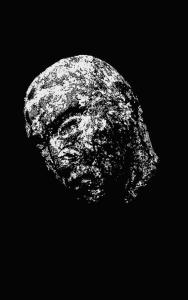
Source
License
Found footage movies face a fundamental problem: editing. For a film to be “found” its makers must have disappeared. Their vanishing is the movie’s raison d’être. Why else would the actors from The Blair Witch Project (1999) sit out Cannes and watch their parents receive condolence letters? A steward might step in and contextualize the movie, but the footage itself belongs to the bygone. Any number of cinematic problems arise. You need to find a reason why the camera cuts from each shot, why this or that phenomenon would actually be seen, why the lighting would look like this and be cut or panned away from like that. Pacing becomes an even greater point of contention than usual. Artifice reigns in the name of realism. It’s like rhyme and meter for the poet. Or maybe more like a pair of cement shoes for the snitch.
Koji Shiraishi’s Noroi: The Curse (2005) finds an elegant but extraordinary way around this problem: what if the filmmaker were just a crank journalist whose Ahab-like passion molds a filmic logic all his own? This puffy-cheeked paranormal investigator is Masafumi Kobayashi (Jin Muraki), constantly followed and taped by his cameraman, Miyajima (Hisashi Miyajima). Only barely contextualized with a few intertitles, the movie Kobayashi has made is intentionally cinematic, both because it is a journalistic investigation intended and cut for broadcast and because his restless mind impresses itself upon the presentation of his results.
Here’s what I mean: early on our intrepid heroes have interviewed a few subjects with spooky neighbors. All of a sudden, we’re watching a TV broadcast that Kobayashi seems to have stolen and added to his movie. It shows a classroom filled with supposedly psychic children undergoing tests to prove their abilities. Vibrant text fills the screen as announcers contort their features in the sort of exaggerated expressions Westerners might associate with Japanese game show hosts. Without any warning, we’re back to grainy interview footage in which Kobayashi asks gormless questions. If a plate flew across a room and smashed into his face, he’d pause and incredulously ask if that was a plate that just flew across the room and smashed into his face. A date appears against a black background. Now we’re watching another TV broadcast with all the production value of an early ECW show. All this before we even know what the mystery is.
These cuts produce a sense of real confusion and urgency. We want to know what TV footage of psychic children has to do with mysterious crying sounds and women who answer the door screaming “how dare you talk to me like that!” Before long there’s a man in a literal tin foil hat and coat screeching about worms from the ether. He becomes something of a guide and is always addressed as “Mr. Hori” (Satoru Jitsunashi). His authority is beyond question for Kobayashi.
These strange cuts, however, also make the movie much more unnerving. We never quite can tell when something awful is going to happen. The subject matter is eerie enough (spoiler: there’s a curse). But when terror can erupt from any single moment no matter how seemingly tame or banal, there’s no escape. Noroi develops its scares from this more than anything else: we want to know what’s going to happen but never feel safe in finding out what it is. Will we see horrific gore or smiling faces on a game show? Dead animals or hapless interviews?
Shiraishi’s film feels especially refreshing because it pioneers its own cinematic mode of expression. Form carries the day. It even builds in how and why we have the footage in the first place, not as a way of generating more artifice to explain bizarre editing but as a way to set up the character of the filmmaker, the drive he shows in exposing himself and the world to the truth of a particular curse, a particular horror. I almost believe this movie is what victims of the tape in Ring (1998) actually see behind the Magritte-esque compositions we, the audience, glimpse. Imagine that: cinema crafted with a logic all its own.













